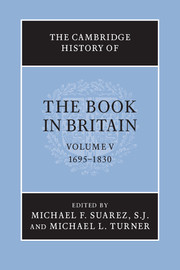Book contents
- Frontmatter
- Introduction
- PART I THE QUANTITY AND NATURE OF PRINTED MATTER
- PART II ECONOMIC, LEGAL AND CULTURAL CONTEXTS
- PART III THE TECHNOLOGIES AND AESTHETICS OF BOOK PRODUCTION
- PART IV THE BOOK TRADE AND ITS MARKETS
- V BOOKS AND THEIR READERS
- I RELIGIOUS BOOKS
- II LITERATURE AND THE CULTURE OF LETTERS
- 33 Book reviewing
- 34 Publishing contemporary English literature, 1695–1774
- 35 British literature, 1774–1830
- 36 Scholarly editing: patristics, classical literature and Shakespeare
- 37 The reprint trade
- III SPECIALIST BOOKS AND MARKETS
- Abbreviations used in bibliography
- Bibliography
- Index
- Frontispiece
- Plate section
- References
35 - British literature, 1774–1830
from II - LITERATURE AND THE CULTURE OF LETTERS
Published online by Cambridge University Press: 28 September 2010
- Frontmatter
- Introduction
- PART I THE QUANTITY AND NATURE OF PRINTED MATTER
- PART II ECONOMIC, LEGAL AND CULTURAL CONTEXTS
- PART III THE TECHNOLOGIES AND AESTHETICS OF BOOK PRODUCTION
- PART IV THE BOOK TRADE AND ITS MARKETS
- V BOOKS AND THEIR READERS
- I RELIGIOUS BOOKS
- II LITERATURE AND THE CULTURE OF LETTERS
- 33 Book reviewing
- 34 Publishing contemporary English literature, 1695–1774
- 35 British literature, 1774–1830
- 36 Scholarly editing: patristics, classical literature and Shakespeare
- 37 The reprint trade
- III SPECIALIST BOOKS AND MARKETS
- Abbreviations used in bibliography
- Bibliography
- Index
- Frontispiece
- Plate section
- References
Summary
Literary history is inseparable from the formation of nations and nationalities. It contributes powerfully to the recognition and celebration of collective practices distinguishing ‘us’ from ‘them’.We write our history – the history of our particular moment in cultural and personal time – across the body of the workswe read. The period that saw Britain’s decisive stand in Europe against Revolutionary and Napoleonic France also saw the first systematic attempt to calibrate a British national character according to literature’s agency. Reading became at this time a significant social and individual indicator and people participated in public culture by virtue of what and how they read. At the same time, the foundations were laid for the professionalization of the activities of the writer and the critic. In thinking about how and why certain works of literature gain status as cultural capital (as ‘Literature’),war as the real test of value has always been important, and Britain was at war for twenty-eight of these fifty-six years.
In the years 1774–1830 literature became increasingly subject to modes of marketing and consumption that helped consolidate its functions, whether for entertainment or instruction, within a domestic space. One material sign of this was the rise in production of smaller format books – more octavos and duodecimos, and fewer quartos – signalling portability and accessibility. Domestication of print was the norm despite (and arguably because of) the threats posed by a renewed radical faith in the press and its power to rally public protest. Prosecutions under libel or blasphemy laws, the imposition of gagging orders, and taxes on paper and print were employed from time to time during the pamphlet wars of the revolutionary 1790s and again in the late 1810s and culminated in the arrests of prominent radical journal editors, booksellers and printers. Such restrictions were aimed as much at defining the acceptable sphere of mass reading and its agency informing the social character as at precise individual targets. Repressive political measures paid tribute to the strength of the perceived link between reading and social action and the consequent need to establish readerships along exclusive lines.
- Type
- Chapter
- Information
- The Cambridge History of the Book in Britain , pp. 667 - 683Publisher: Cambridge University PressPrint publication year: 2009



